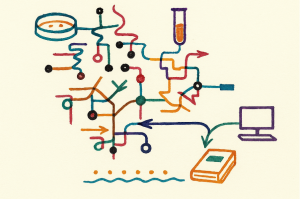From Hypotheses to Discovery: International Consortium Investigates How AI is Transforming Science
The Scientific Method Meets Machine Intelligence: Rethinking Discovery in an LLM World
This is no longer about whether AI can do science. It is about whether we understand the science that AI does — and whether that still counts as science at all.”
LONDON, UNITED KINGDOM, August 5, 2025 /EINPresswire.com/ -- An international group of world leading researchers in the field of AI for Scientific Discovery, spanning 20 leading institutions— including experts from NVIDIA, Harvard, Stanford and Edinburgh — has released a thought-provoking perspective paper examining how Generative Artificial Intelligence (Gen AI), especially large language models (LLMs), is already reshaping the very structure of scientific research and the scientific method.— Dr. Hector Zenil, Associate Professor, Kings' College London
The paper, published in the Springer Nature journal npj Artificial Intelligence, led by Dr Hector Zenil, Associate Professor / Senior Lecturer from the School of Biomedical Engineering and Imaging Sciences at King's College London, explores the fundamental transformations underway in how science is conducted. Far from being a futuristic speculation, the authors argue that artificial intelligence is already infiltrating every corner of the scientific method: from automating literature reviews to drafting papers, designing experiments, and even generating new hypotheses from large search spaces that humans would never be able to explore.
Dr Zenil and colleagues warn that the loop may soon close entirely. That is, LLMs may soon be capable of not only suggesting research directions but also designing and carrying out experiments with little to no human intervention. This possibility raises pressing questions about the future role of human understanding in science.
The paper highlights a growing risk: while machines may increasingly excel at generating useful results, they may do so without offering meaningful insight into the underlying principles. A striking example the authors cite is AlphaFold, an AI system developed by DeepMind. AlphaFold is famously credit to solving the problem of predicting how proteins fold — a challenge that had resisted scientists for decades — with remarkable accuracy. But while AlphaFold can correctly identify the end shape of proteins, it offers little in the way of new explanations or deeper understanding of why they fold as they do without human expert-domain interpretation. It is a powerful prediction tool, but it adds no many “first principles” to biology textbooks. It is, in essence, a black box with astonishing results that sheds little to no light on the mechanisms behind dictating protein shapes.
This, the authors say, points to a broader philosophical and scientific tension. Do we value scientific discovery for its predictive power, or for its capacity to deepen our understanding of the world? For its human content and context? If Generative AI excels at the former but not the latter, are we ready to accept an age of "post-explanatory" science and would that still be science as we know it?
Dr Zenil and his team also address the limitations and risks of this AI revolution. Models like ChatGPT, Claude, or Gemini are trained on vast quantities of existing data, including papers, code, and experiments. This means they risk reproducing past errors, biases, or blind spots, and may fail to explore genuinely novel or risky ideas. The paper also considers concerns about reproducibility, intellectual ownership, and the potential for automation to deskill human researchers.
Yet the authors are not alarmists. They see enormous opportunity in integrating AI into scientific workflows — not as a replacement for human thinking, but as a powerful extension and partner. By accelerating hypothesis generation and exploratory analysis, Generative AI could open new avenues of research that would have otherwise taken years to pursue.
The paper closes with a challenge to the scientific community: it is time to decide what kind of science we want to preserve in human hands, and what we are willing to delegate to machines.
The full paper is published in npj Artificial Intelligence (Springer Nature) and available via the Nature portal
PR Team
OxfordIA
+44 7788 646243
email us here
Legal Disclaimer:
EIN Presswire provides this news content "as is" without warranty of any kind. We do not accept any responsibility or liability for the accuracy, content, images, videos, licenses, completeness, legality, or reliability of the information contained in this article. If you have any complaints or copyright issues related to this article, kindly contact the author above.

